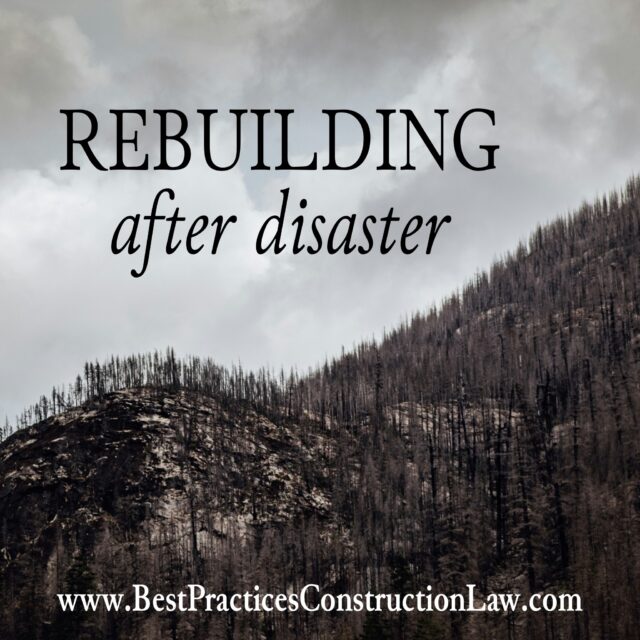Matthew DeVries and Heather Wright | Best Practices Construction Law
“This is the worst-case scenario to prepare for,” said Kristan Lund, a meteorologist with the National Weather Service, when talking about the recent wildfires in Los Angeles and the subsequent heavy rainfall.

The aftermath of debris, mudslides and flooding has left a path of devastation, destroying both commercial and residential properties, displacing thousands of residents, and making the reconstruction efforts challenging. The process of disaster recovery extends beyond immediate relief efforts; it involves the intricate planning, permitting, and execution of reconstruction projects.
Insurance Challenges and Coverage Issues
One of the primary concerns for affected property owners is whether their insurance policies cover post-fire mudslides and flooding. Typically, standard homeowners’ insurance and commercial property policies exclude coverage for floods and earth movement. However, under California’s “efficient proximate cause” doctrine, policyholders may still have a valid claim if the primary cause of the flooding or mudslide is determined to be the wildfire.
While Insurers are required to assess whether a wildfire was the efficient proximate cause of the subsequent damage, proving this connection can be complicated and may require expert assessments.
Debris Removal and Rebuilding Obstacles
In addition to navigating insurance claims, property owners must also address debris removal—a critical step before rebuilding can begin. For example, the Los Angeles County Debris Removal Program offers assistance at no cost to homeowners, ensuring that insurance benefits remain available for rebuilding rather than being exhausted on cleanup expenses. However, property owners who opt for private debris removal risk having these costs deducted from their insurance payout, reducing the funds available for reconstruction.
The challenges of rebuilding extend beyond debris removal. Material shortages, supply chain disruptions, and increased labor costs—compounded by potential new tariffs by the Trump Administration—may significantly drive up the price of reconstruction. Property owners may also need to adhere to updated building codes, which can add further costs. Understanding potential insurance benefits related to building code upgrades is crucial.
10 Steps to Maximize Insurance Recovery
To improve the likelihood of a full recovery, property owners should take the following steps:
- Review Your Policy Coverage – Understand what your homeowner or commercial propertyinsurance covers, particularly regarding post-wildfire flood and mudslide damage.
- File Claims Promptly – Insurance policies often have strict deadlines for claim filing. Report losses as soon as possible and document all communications.
- Request Advance Payments – Under California law, policyholders are entitled to advance payments for additional living expenses (ALE) and personal property without itemized lists.
- Assess Damage Thoroughly – Consider hiring a licensed public adjuster to assist in the preparation of your claim, particularly if you think your insurer’s appointed adjuster has undervalued your claim.
- Utilize City and County Debris Removal Programs – Enrolling in these type of programs may prevent debris removal costs from depleting insurance funds designated for rebuilding.
- Document Everything – Take photos and videos of all damage, keep receipts for temporary housing, and maintain detailed records of all interactions with insurers.
- Check for State and Federal Assistance – FEMA and state programs may offer additional financial aid for uninsured losses.
- Understand the Efficient Proximate Cause Doctrine – Work with legal and insurance professionals to consider whether wildfire may be the primary cause of later damage.
- Beware of Scams – In the aftermath of disasters, fraudulent contractors and adjusters prey on victims. Verify credentials before signing contracts.
- Consider Legal Assistance – If an insurer denies coverage or offers inadequate compensation, consulting a lawyer with experience in construction and insurance disputes may be necessary.
Recovering from the LA wildfires and subsequent mudslides presents a multi-faceted challenge for property owners. From navigating complex insurance claims to addressing debris removal and escalating construction costs, the road to rebuilding is filled with obstacles. By understanding their rights, taking proactive steps, and utilizing available resources, property owners can improve their chances of maximizing insurance recovery and restoring their properties.
When one of your cases is in need of a construction expert, estimates, insurance appraisal or umpire services in defect or insurance disputes – please call Advise & Consult, Inc. at 888.684.8305, or email experts@adviseandconsult.net.
